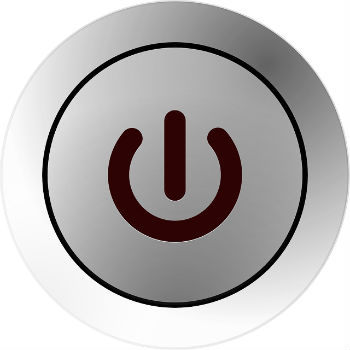Q. If I close the lid does it shut off my laptop?
A. Simply put, a shutdown computer is turned off. It can’t be accessed remotely so it can’t receive patches and updates. For this reason a Desktop PC under F1 management should not be left shut down for an extended period of time (more than a week). On the other hand, laptops should be shut down if they are going to be put into their case or if they aren’t on AC power and not being used. A shutdown should be done from the start button. (Start>shutdown) PCs are usually configured so that they will shut down when pressing and holding the power button once. Simply shutting the lid does not accomplish this, however on most laptops shutting the lid puts the laptop into what is called “hibernation” or “sleep” mode. This uses minimal power and allows for a quick return to what you were doing but it does shut down network connectivity as well as the operating system. In Hibernation mode your laptop will not receive updates. These options are configurable, you can have your laptop shut down, go to sleep, or just remain completely on when you close the lid.

Q. If I my computer shuts down while I have a document open, what happens to that document?
A. When the PC gets the shutdown command the computer closes any programs and asks the user to save any open files. Always answer yes! While working save your data frequently. Then Windows shuts down properly, saving any necessary data to the hard drive. The hard drive stops spinning, and the computer is turned off. The PC still uses a trickle of power, mostly to monitor the power button (and possibly the network card) for a signal to power on. If you do not save these changes you may lose work.
Q. My computer “locked up” what do I do?
A. If a PC completely locks up it can be shut down by holding down the power button for several seconds. However, the PC does not have time to save open files or shut down the Windows operating system properly. This can result in the operating system becoming corrupt and any unsaved data will be lost. So this should only be done when there is no choice. Many times a computer will be unresponsive for a while when it is installing patches, downloading files, or waiting for some running process to complete. Forcing a shutdown in these circumstances can corrupt Windows. Sometimes patience and trying later will help the situation. You can also try a control- Alt- delete combination to do a force quit on pc’s.
Q. I suspect I may have a virus on my system should I turn it off?
A. Not yet. First, disconnect the network cable in the back or disconnect from wireless, which will isolate that system from the network then hold the power button and do a forced shutdown. Any data that was open will be lost, but will save your network from possibly becoming contaminated as many viruses today seek out shared network folders in order to spread to other computers in the company.
Q. My PC won’t turn on?
What do I do? When a PC will not power on it is usually this is the result of a hardware failure. But, on occasion, a PC can enter a state where it simply refuses to respond to the power button. Pulling the power plug from the wall (or from the UPS) and then holding down the power button for several seconds drains any residual power and can often cure these kinds of lockups. (Remember to also remove the battery if this is a laptop.) If problems persist bring it to F1 for evaluation.
Q. What is the difference between Logging off and shutting down my computer?
A logged off computer is running but no user account is accessing it and the only programs running on the computer are system services. In the logged off state a computer can receive patches and updates and the patch management software can reboot the PC as needed without any risk of deleting user’s data. As a very important side note, a PC stores data, program, and operating system files on the hard drive but the processor has to run them from memory (RAM). Programs and necessary Windows files are copied to RAM as they are needed. As the PC runs, data in RAM can sometimes get corrupted. And sometimes programs will leave left over clutter in RAM instead of cleaning up after themselves properly. A reboot clears the RAM completely and clean out any clutter or corrupt files. This is why rebooting a PC fixes so many problems. It is also why it is a good idea to reboot your PC every night. It puts the PC in a state (logged off) where it can be patched overnight and it clears out any corrupt files or clutter in RAM.
Q. Why can someone else use my terminal if I am logged off of my system?
A. Some settings on the PC are controlled by the user’s profile. When a different user logs into a computer they will get a different desktop or Roaming profile and have access to different files than you do. Also, a computer might misbehave for one user and not for another. For this reason, a technician may need to use your account to troubleshoot a problem on a PC.
Q. Why does my computer log off when I step away from my computer for any length of time?
A. When you are logged in and stay inactive for a while your PC will lock, if it is set to do so. For security reasons many companies have this implemented within their organizations. If you are a medical client who fall under HIPAA and HITECH the recommended time of inactivity before the computer logs off or locks is 10 minutes in normal areas and 2-3 minutes in high traffic areas. A locked PC is still logged in but no one can access the desktop until you enter your password. You can lock your PC without waiting by pressing ctrl+alt+del and selecting “lock this computer.” Or you can hold the windows key at the same time you hit “L” and you will lock it out quickly. When a user “logs into” the PC they gain control over the PC and have access to their files in their profile. Their personal settings load (desktop wallpaper, favorites, etc.) as well.

